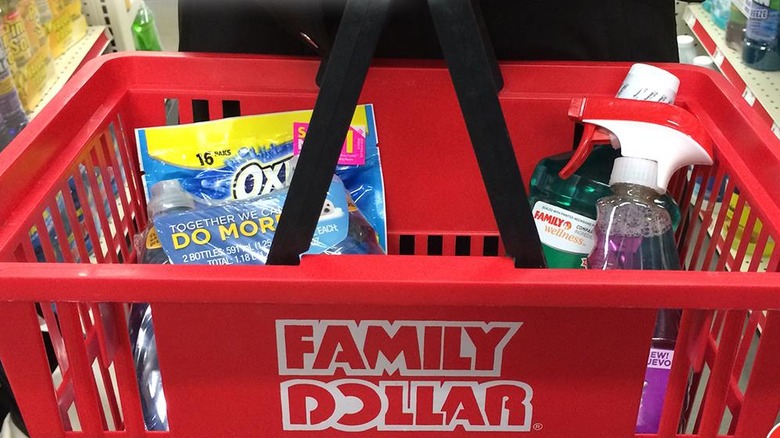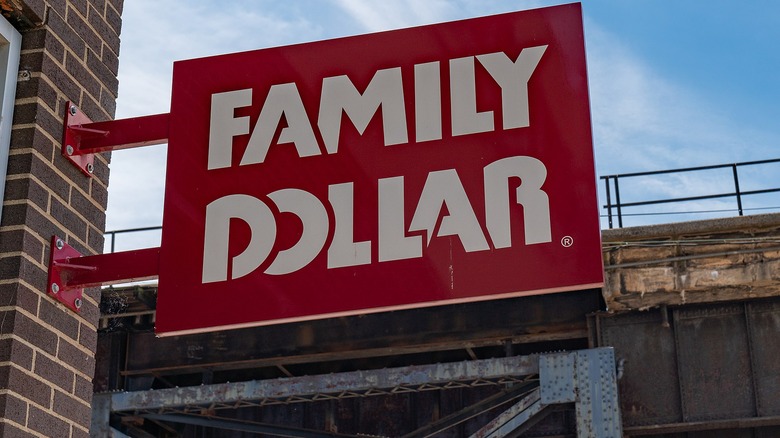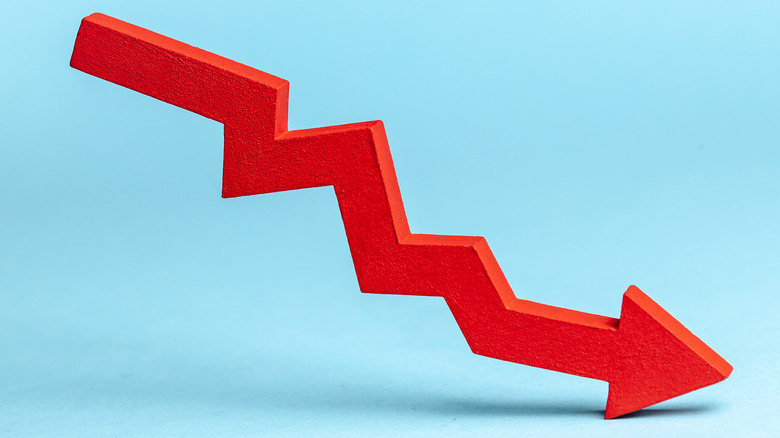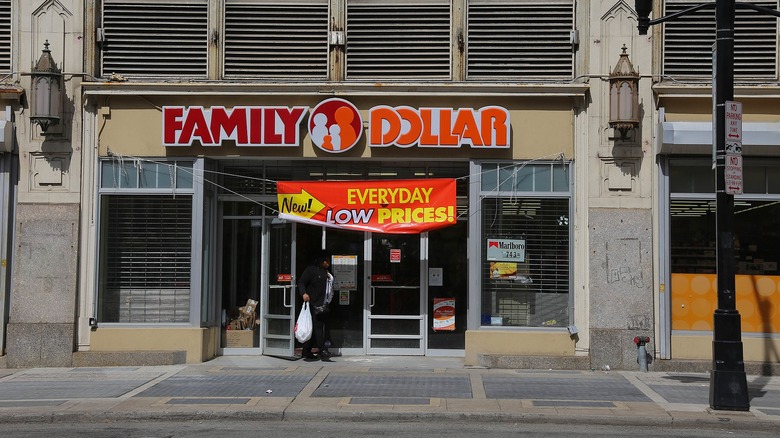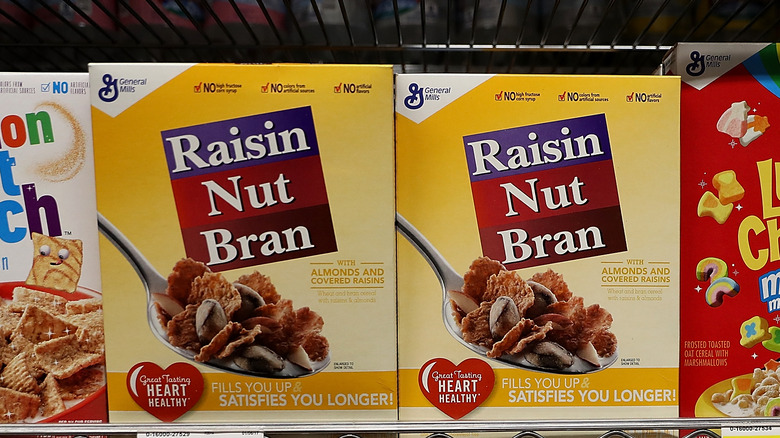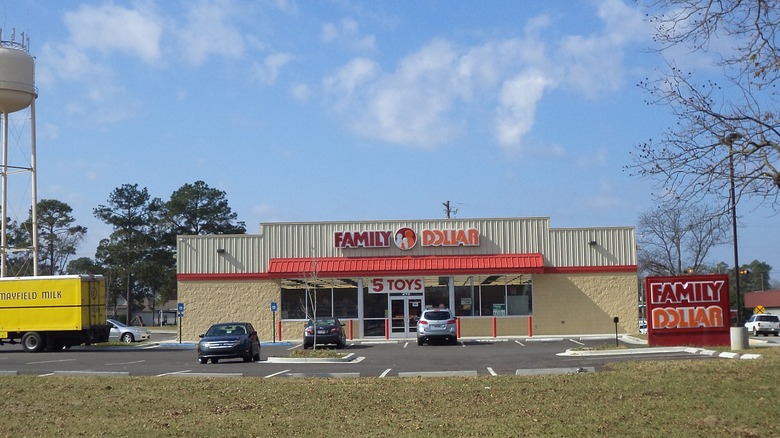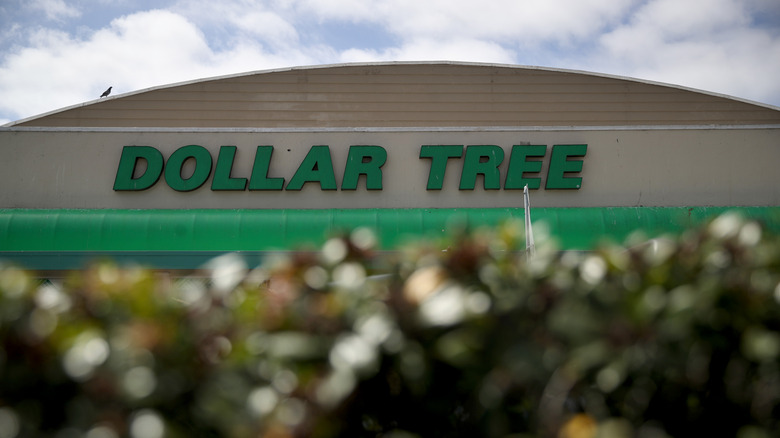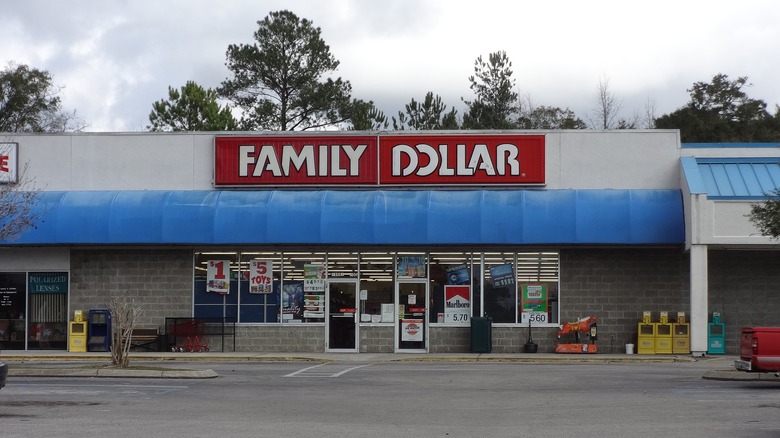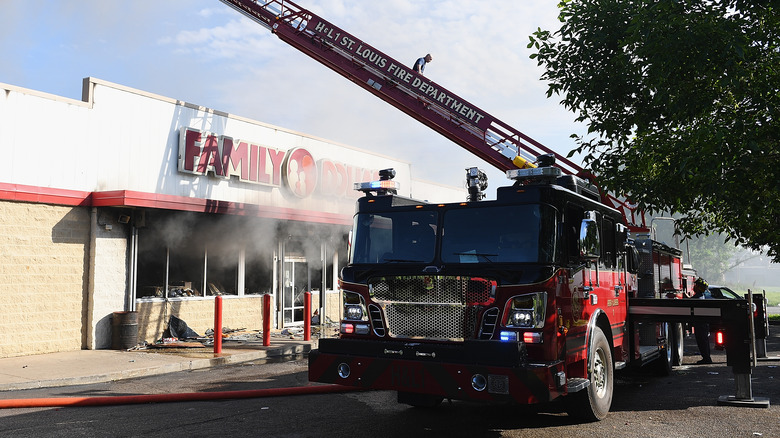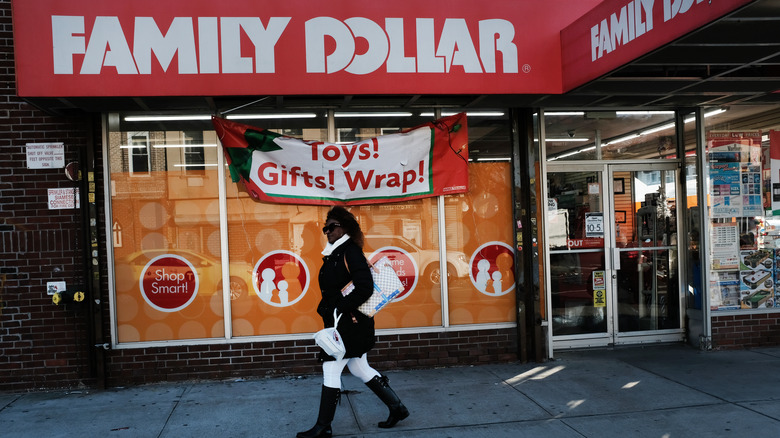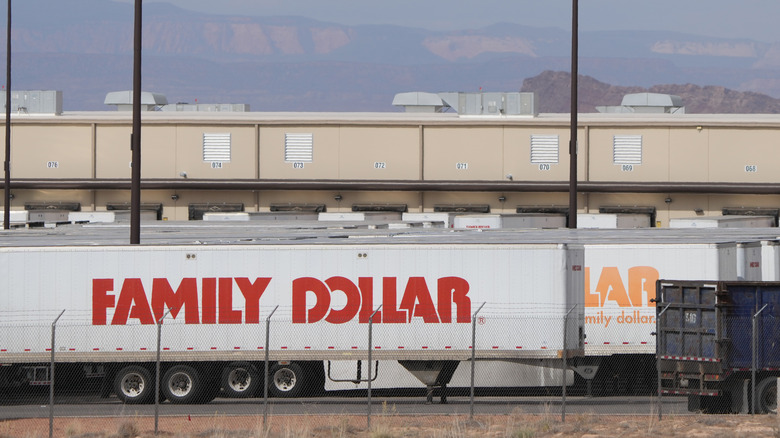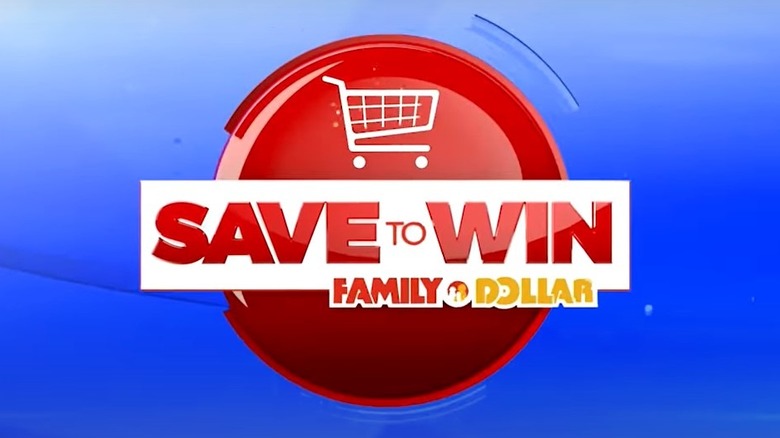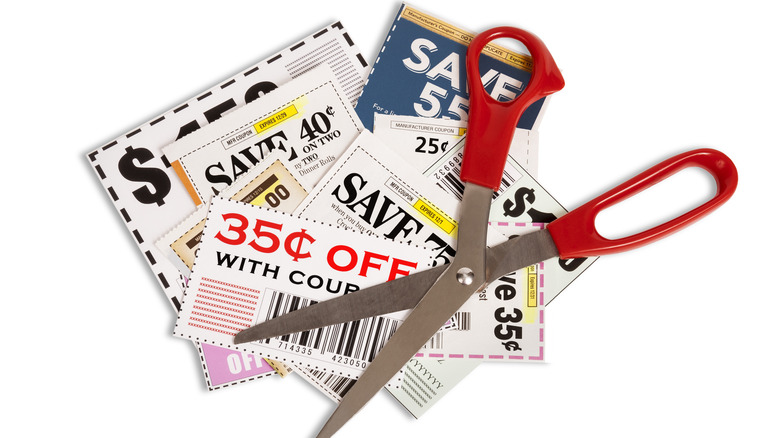15 Things To Know Before Shopping At Family Dollar Again
To many, the Family Dollar chain of discount stores seems like another faceless corporation. But it has a face, and quite a young one in the early days. The first store was opened by a young man who already had a lifetime of retail experience in his family's retail store.
During the remainder of the 20th century, Family Dollar expanded rapidly throughout the south, then the country. It went public, offering common stock, in the early 1970s, struggled that same decade thanks to historic shifts in the textile industry, and continued to see major growth in the 1980s and '90s. By 2002, Family Dollar made the Fortune 500 list, and all this success led to the founder donating millions of dollars to charities, colleges, and social projects.
In recent years, Family Dollar has made some commotion in the business news world, including hostile bids, mergers, and a backslide in growth. Not to mention the chain's magnetism for crime in working-class neighborhoods. Oh, and you probably shouldn't eat the food, either. But even more recent news shows how what started as one little bargain shop has been able to thrive during a pandemic as an essential business. This is the story of Family Dollar.
1. The first Family Dollar was opened by a 22-year-old
Many people in their early 20s are most likely in school or working entry-level jobs, not opening what would be the first of thousands of stores across the country with one simple concept: Nothing is more than $2.
But Leon Levine, the Family Dollar founder, was not without experience in the discount shop game. As a kid, Levine and his brothers worked in their father's department store called The Hub. Then, a series of events threw Levine into a more demanding role. His father died in 1949, and his brother was drafted into the Korean War. A teenage Leon was soon running The Hub and was even vice president of the store from 1954 to 1957.
During his vice presidency, Levine and his brother, back from the Korean conflict, bought a chenille bedspread factory called Union Craft Company. This was near Wingate College, where Leon attended business classes in the morning before running the factory in the afternoon. (It should also be noted that Levine's other brother, Al Levine, founded Pic-n-Pay in 1957.) By 1959, Levine had sold the bedspread factory and made one important trip — he visited a dollar store in Kentucky. Inspired, Levine, now married and a father, opened the first Family Dollar later that year. He was 22 years old.
2. Family Dollar started as one store in Charlotte, North Carolina
Founder Leon Levine started the Family Dollar chain in November 1959 with its first location on Central Avenue — between Pecan and Thomas avenues in the Plaza-Midwood — in Charlotte, North Carolina. Levine opened the store with about $6,000.
According to the Family Dollar website, the only other concept Levine was shooting for, aside from all the products being $2 or less, was the idea that "the customers are the boss, and you need to keep them happy." Those customers Levine aimed to please were of members of middle- to low-income communities. Although, according to Our State, the average customer is "a woman in her mid-40s who makes less than $40,000 a year and is the head of household."
Soon, Levine had four stores in the Charlotte area. Then, Family Dollar had expanded into South Carolina by 1961, underselling the shore stores at Myrtle Beach in swimwear and towels. By 1967, Family Dollar had 27 stores operating in four states in the southeast, with annual sales reaching more than $5 million.
3. The 1970s were apparently a tough time for Family Dollar
The 1960s was a time of major growth for Family Dollar and its founder. In fact, Our State mentions that, "It took 10 years to open 100 Family Dollars in the Southeast."
The 1970s started with another milestone — Family Dollar went public as a company, offering common stock at $14.50 a share. And even though the young chain had opened its 100th store in 1971, its first distribution center in Matthews, North Carolina, in 1974, followed by its 200th store, the decade would prove to be a challenge.
But by the mid-70s, major shifts in the American textile industry had major effects on Family Dollar's southeastern-based consumers. As workers in the furniture, textile, and tobacco industries were laid off, the discount store began to first see declining sales — dropping as much as 50 percent in 1974 and 1975. But the scrappy chain put together new marketing, began to relax its reputation for selling items for less than $3 (by that point), and added an electronic data processing system. Things soon stabilized.
In the end, Family Dollar was fine. More than fine. Annual sales flew past $100 million by 1977, and the aforementioned common stock began trading on the New York Stock Exchange to polish off the decade in 1979.
4. The founder of Family Dollar is a major philanthropist
It'd be hard to argue that Family Dollar founder Leon Levine wasn't a rich man. But our humble founder took his success in a distinct direction. In 1980, Levine and his second wife, Sandra Poliakoff (his first wife Barbara Leven died of breast cancer in 1966), established The Leon Levine Foundation with the mission "to improve the human condition by creating permanent, measurable, and life-changing impact throughout the Carolinas."
Operating out of where else but Charlotte, North Carolina, the foundation invests in nonprofits and projects with "a focus on sustainability in the areas of healthcare, education, Jewish values, and human services." The couple was soon making big moves with the foundation, donating $1 million to the creation of Shalom Park in 1980, and The Sandra and Leon Levine Jewish Community Center was soon named after them.
Large donations continued, including $10 million for construction of The Levine Science Research Center at Duke University in 1991, $1 million to name the Levine Museum of the New South, $2 million for the Levine Ramah Center at Camp Ramah Darom in 2000, and so on.
To date, TLLF has made countless donations. By 2013, Levine had given away more than $75 million through the foundation. And it's still going. In 2019, TLLF granted $5 million to an affordable housing campaign in Charlotte, and the Levine Children's Hospital is doing some cool stuff for patients who need stem cell transplants.
5. After four decades, Family Dollar made the Fortune 500 list
As anyone could guess, the 1990s spelled success for the business. Family Dollar's yearly sales exceeded $1 billion by 1992, a second distribution center was opened in 1994, and the chain circled back to its hometown of Charlotte to open store number 2,500. By the new century, annual sales had surpassed $3 billion, and in 2001, the business was added to the S&P 500 Index.
Therefore, it's no surprise that by 2002, Family Dollar became a member of the Fortune 500 list — the annual rundown of the largest 500 corporations in the United States as published by Fortune magazine. This would also be one of the last milestones founder Leon Levine would see as the head honcho. He would retire the following year, carrying with him the title of Chairman Emeritus, and his son Howard R. Levine would take over as CEO.
6. Sure, Family Dollar has food, but you probably shouldn't buy it
Breakfast cereal, baking supplies, canned food, and all manner of snacks. These are all available at Family Dollar, and that's not news. Thought the chain started selling mostly clothes and motor oil, there's been a discount grocery component for decades. But some of the food options here, you may or may not be surprised to know, are not great, and they should never be hitting the bottom of your cart.
Chips are often cheap but frequently sold at a much lower weight. Same goes for name-brand cereal and packs of gum. Milk, soda, spices, condiments, and canned goods are not actually sold at discount prices. And if you're the type who puts open boxes of baking soda throughout the muskier areas of your home and think dollar stores are a great way to bankroll a fresh-smelling house, wrong. Baking soda is often less expensive at the grocery store. As for cheese and steak, if you care to call it that, you may be taking home some of the lowest-grade products your local dollar store could possibly shelve.
But hey, quick and convenient is quick, convenient, and mostly inexpensive, so if you've got friends on the way or the grocery store happens to be closed, there's no shame in visiting the closest Family Dollar. A can of Campbell's Condensed Chicken Noodle Soup sold by any other store would taste just as salty.
7. Each Family Dollar store has roughly the same layout ... or did
Founder Leon Levine started with a simple floorplan right from the beginning. But according to the website, there was a method to this nearly identical madness: "With the stores uniformly laid out and stocked, store managers were able to focus on providing good customer service."
To take it back to the 1990s, Family Dollar somewhat graduated from the neighborhood general stop and became more of a mini department store. Locations started selling more electronics, toys, and tools.
Over time, most were designed with women's wear in the front, on the right, to better appeal to Family Dollar's average shopper. A journalist in North Carolina even tested it out in at some locations in Charlotte and Ohio. Sometimes food was in the front, sometimes in back. Stores even started selling cigarettes in 2012. But each store was more or less the same: neat, simple, bright, with whole-dollar items on the shelves, and that now-classic red, orange, and white motif.
That is, until Dollar Tree took over.
8. Family Dollar was acquired by Dollar Tree in 2015
In 2014, Family Dollar announced its agreement to merge with Dollar Tree and became a wholly-owned subsidiary of the discount store giant by July 6, 2015. But the merger was not without drama.
According to The Charlotte Observer, there was a hostile bid to take over Family Dollar from another discount retailer, Dollar General. In the end, which is to say early 2015, Dollar Tree won out after Dollar General "couldn't prove to shareholders that antitrust regulators would approve its Family Dollar purchase."
At the time, the Dollar Tree and Family Dollar merger meant the combined company would pull in annual sales of more than $19 billion, all while overseeing more than 13,000 stores, according to The Charlotte Observer. Because of the number of locations, the joint company is the United States' largest dollar-store chain. Dollar Tree CEO Bob Sasser had big plans for the Leon Levine-founded chain. Sasser said he planned to lower prices at Family Dollar, since items there had reached up to $10, and improve the appearance of many neglected locations.
9. Family Dollar closed about 400 stores in 2019
"I think Family Dollar has a little bit more of a real estate problem than people realize," Edward Jones analyst Brian Yarbrough told The Charlotte Observer once Dollar Tree completed purchase of Family Dollar. "It's going to take several years of remodeling stores, fixing them up and probably moving some locations or shutting some locations down."
That promise was kept. In 2019, it was announced that 390 Family Dollar stores were closing. This was new for the discount chain considering that, since its founding in 1959, the company had done nothing but grow. After the merger with Dollar Tree, however, Family Dollar sales were sluggish, which meaning Dollar Tree was getting taken down with it. By January 2019, according to MarketWatch, "activist investor Starboard Value LP revealed a stake in Dollar Tree and asked management to consider selling Family Dollar, even at a loss."
Therefore, Dollar Tree decided to hemorrhage nearly 400 Family Dollar stores. As a result, Dollar Tree stock jumped up, especially considering that in addition to the closing, another 200 Family Dollar locations would be re-branded as Dollar Trees, and another 1,000 stores would be renovated.
10. Discount stores like Family Dollar can be crime magnets because of retail void
On a recent news search of Family Dollar, headlines tell of attacked employees, shootings, car accidents, and ever warnings from the mayor of a town one location happens to be sitting in. According to a recent article, a collaboration between The New Yorker and ProPublica, discount chains like Family Dollar have become magnets for crime and killing is some areas.
The high frequency of these crimes may also be attributed to the sheer number of stores. Family Dollar now has more than 8,000 locations. However, there is often a retail void in poor and working-class communities. In 2019, discount chains accounted for more than half of all retail stores opening. Therefore, in these lower socio-economic, often high-crime neighborhoods, there just aren't other businesses for criminals to target.
"In a lot of these areas, they're the only stores around," says reporter B. J. Bethel with WDTN (via ProPublica), "It's the only place to get cash." In addition to robberies, carjackings, drug transactions, and altercations can occur.
11. Family Dollar is an essential business, and business has been booming
In 2020, the COVID-19 pandemic devastated certain industries, including the service industry, but discount chains in the U.S. have fared relatively well. As coronavirus-related quarantines and business shutdowns began in March, both Dollar Tree and Family Dollar stores were considered essential businesses and were permitted to remain open. According to BusinessWire, "both Dollar Tree and Family Dollar stores began to experience a material pick-up in store traffic and sales related to essential products ..." Those products included cleaning supplies, sanitizer, household products, paper goods, food, and medicine.
As a result, the many store renovations were temporarily suspended, and Family Dollar had to reassess its full-year fiscal 2020 plans. However, sales continued to see a steady incline, even as all 15,000-plus stores began closing at 8 p.m. in order to limit exposure to associates, start on new cleaning protocols, and restock shelves with essential products.
By the end of March, sales were reported to be up 7.1 percent at Dollar Tree and up by 14.4 percent at Family Dollar. By the end of the first quarter on May 28, Family Dollar had opened 99 new stores, renovated or relocated 21 stores, and closed 14. As a result, "same-store sales for Family Dollar increased 15.5 percent."
12. Family Dollar had to close a warehouse because of rodents
Given the bargain basement-level prices found at Family Dollar, there's a general understanding regarding its products' overall quality. That's not to say that items sold at Family Dollar won't get the job done, but most will say that there's a marked difference between the chain's off-brand macaroni and cheese and a box of Kraft. Still, customers expect any products purchased from there to be safe. But that isn't always the case, as evidenced by the shutdown of the company's West Memphis, Arkansas-based distribution center in February 2022 (via New York Times).
The issue? A widespread rodent infestation. While rodents running amok is bad enough, when it comes to Family Dollar's forced shutdown in early 2022 (which included the temporary closure of more than 400 stores in six states), the devil is in the details. According to the FDA, a January 2022 investigation of the facility unearthed numerous rodent droppings, nests, and actual rodents — including more than 1,100 dead rodents in "various states of decay."
Since rodent infestations can expose humans to dangerous bacteria and other pathogens, the company issued a voluntary recall for all impacted items, alongside a list of affected stores (via Business Wire). By June 2022, each closed store had been deemed safe to reopen, according to Retail Dive, except for the now permanently-closed distribution center in Arkansas.
13. Family Dollar doesn't have the best reputation for workplace conditions
Usually, a person's ideal job is about more than simple dollars and cents. Sure, a well-paying salary is certainly part of most folks' dream professional scenario. But the type of job and how an employer treats you plays a huge hand, as well. Unfortunately, if your dream job is at Family Dollar, the company may end up letting you down across the board, according to Business Insider.
Given that the company has been sued on several occasions by former employees, it's little surprise to discover Family Dollar has a less than stellar reputation amongst workers. In fact, as former store manager Tricia Giles told Business Insider in 2022, the company doesn't "care if you're dead [...] you're supposed to come in there, not breathing, and work." From forcing long hours to dramatically underpaying both associates and managers, Giles made it clear that "there is no 'family' in Family Dollar" for employees.
According to OSHA official Danelle Jindra (via CNN), Family Dollar has "a history of not taking the safety of its workers and customers seriously." In light of the extreme rodent infestation that forced hundreds of stores to temporarily close in early 2022, it seems nigh impossible to argue against that accusation.
14. Family Dollar launched its own game show in 2016
Modern consumers are fairly accustomed to the marketing tropes often employed by companies, particularly the synergistic appearances of brands on TV shows. Yet some companies still manage to surprise us from time to time. This was the case in the mid-2010s, when Family Dollar chose to promote its stores by producing its own televised game show called "Save to Win" (via The Virginian-Pilot).
"Save to Win" debuted in 2016 on The CW, according to its Facebook page, and aired on Saturday mornings. In an apparent riff on both "Supermarket Sweep" and "Guy's Grocery Games," the show offered a pair of two-person teams the chance to win $5,000 through various challenges. Hosted by celebrity chef Pat Neely, alongside a fictional store associate played by Mariana Cardenas, the show didn't seem to register much on the pop culture radar. A mere 17 episodes aired during a single season.
Curiously, as of 2022, there seems to be very little evidence "Save to Win" ever made it to screens at all. Nary a mention of the television show could be found on Family Dollar's website and we were unable to find anything concrete regarding the show's status after its sole season. However, we can confirm the show did exist, as all 17 episodes are available to watch on the Family Dollar YouTube channel.
15. You have a variety of coupon options at Family Dollar
While some people who are living in food deserts — areas that have little or no access to fresh, healthy, and affordable foods (via University of Memphis) — may be forced to shop at Family Dollar out of necessity, others are more like Christmas Tree Shop patrons: they just love a bargain. Fittingly, the discount retail outlet provides a variety of ways for its customers to save even more money on every purchase, including digital Smart Coupons via the company's app (via Family Dollar).
Through its partnership with applied data platform company Inmar Intelligence, the Smart Coupons program helps users find and use coupons while shopping. Smart Coupons seem to function as a kind of rewards account for Family Dollar customers and require a person to create an account connected to their phone number to utilize them.
If you're less inclined to provide your personal information to Family Dollar, the company still has you covered. After all, according to Family Dollar, it still accepts more traditional paper coupons as of 2022. While there are some limits to the company's paper coupon policy, the fact the retail chain accepts both store-issued and manufacturer paper coupons is a boon to less technologically-savvy customers.
